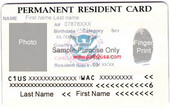TSA to Start “Secure Flight” Screening of Air Passengers
Many of Romben Law, APC’s immigration law clients travel frequently — domestically and internationally. Passengers, whether in Los Angeles or elsewhere, will begin to notice the “Secure Flight” screening. Airlines will input traveler information so that the Transportation Security Administration (TSA) can screen each person. Airlines will begin asking not only for name, but now also date of birth and gender. TSA will match these names against the no-fly and other watch lists.

 Immigration Visa Attorney Blog
Immigration Visa Attorney Blog


 The Obama Administration
The Obama Administration 

